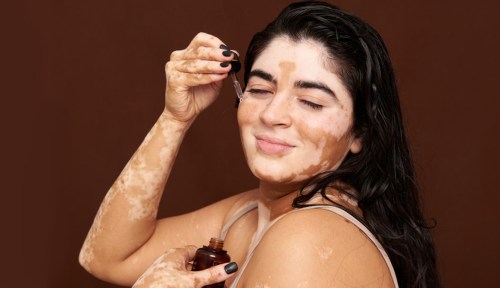5 Non-Negotiable Rules a Derm Is Begging You To Follow If You Want To Use Fragrance on Sensitive Skin
If you proceed with caution and stick to a few rules, you might find that you can actually tolerate fragrance on your sensitive skin.

If you’ve got sensitive skin, you’ve likely heard time and time again that fragrance is a big no-no. It’s something we’ve reported on at length, and though it’s a good general rule to follow, it can be super frustrating to hear if you want to try products that feel more luxe. The good news? Chances are, your skin won’t be irritated by every fragrance out there. And if you proceed with caution and stick to a few rules, you might find that you can actually tolerate a little bit of fragrance on your sensitive skin.
Experts in This Article
board-certified dermatologist at Medical Dermatology and Cosmetic Surgery in New York
“When it comes to fragrance, it can be very tricky because some people think just by avoiding fragrance entirely, then they’re sort of in a good place,” says Marisa Garshick, MD, a board-certified dermatologist in New York City. “But a lot of the times fragrance does have nuance, so it’s important to be mindful of that.”
Even if you go to your derm or allergist and get an allergen patch test that shows a fragrance allergy, you’re probably not allergic to all fragrances.
“When fragrance is formally tested in a medical office patch test, the mixture includes different fragrances that can be used to screen for a fragrance allergy,” says Dr. Garshick. “While a positive patch test may indicate that you’re allergic to one or more of the fragrances, it doesn’t necessarily distinguish which one… and just because one fragrance causes a sensitivity doesn’t mean that all fragrances will.”
Depending on your level of sensitivity, fragrance might really be off-limits for you. But if you’re down to try, keep reading to learn how to use skin-care products with fragrance on sensitive skin.
How to use skin-care products with fragrance on sensitive skin
1) Do a patch test
Before putting any product on sensitive skin, it’s important to do a “patch test.” This means applying a small amount to the skin on either your arm or wrist to see if it causes a reaction before going all in on your face. If your notice any sensitivity—which will usually show up in the form of a rash called contact dermatitis—it probably means you’re allergic to something in the formula (*cough cough* the fragrance). Consider this the first (and most obvious) sign that you shouldn’t be using it.
2) Be mindful of formulations
“It’s important to avoid strong scents and be mindful of the way the products are formulated,” says Dr. Garshick. She adds that you should generally avoid products made with alcohol, which can be irritating on its own, and may want to opt for light and airy scents over heavy florals and musks.
This Parisian Skincare Brand Is Launching in the United States for the First Time—Here’s What a Derm Wants You to Know

We’re Calling It: Cleansing Balms Are the Face Wash of the Future—Here Are 3 to Add to Your Cart

This Is the One Product That Scarlett Johansson Always Keeps in Her Purse and on Her Bedside Table

And while a natural fragrance might seem safer than a synthetic fragrance, it’s really not. “Both natural and synthetic fragrances can cause irritant contact dermatitis or allergic contact dermatitis, so it is important to be mindful about how much fragrance is in a product,” she says. “For example, some [scented products] made for those with sensitive skin may offer a light fragrance and not necessarily cause an issue.” The serum made with 15 essential oils, though, is probably off the table. “Whenever you have sensitive skin, less is always going to be more,” says Dr. Garshick, so be sure to keep it simple.
4) Combine with simple, gentle ingredients
The “less is more” edict also applies to the rest of your routine—which should be stacked with simple, gentle ingredients. You’ll often hear this tip thrown around in relation to introducing harsh actives, like retinoids and exfoliating acids, but it also applies to fragrance. “It can help to use products that are also working to support the skin barrier and nourish the skin which can help to strengthen the skin barrier and make it less likely to react to fragrance,” says Dr. Garshick. Look for ingredients like ceramides, which strengthen the skin barrier, and hyaluronic acid, which aids in hydration.
4) Don’t use too many scented products at once
“If you have sensitive skin and are looking to try products with fragrance, it is important to avoid using too many scented skin-care products at the same time—be sure to only introduce one new product at a time,” says Dr. Garshick. In other words, now is not the time to run out and replace your whole routine. If your patch test goes well and you’re ready to give a product the full-face test, give your skin a few weeks to acclimate to it before trying to introduce others.
5) Avoid the eye area
“For a lot of people, the eyelid skin can be a little bit more sensitive than the rest of the face,” says Dr. Garshick. This might mean you want to stay away from things like scented cleansers that are meant for the full face. Instead, opt for a lightly scented serum or oil that can easily be applied while avoiding the eyelid area.
If your sensitive skin is caused by rosacea, here are a few tips to help manage:
Want even more beauty intel from our editors? Follow our Fineprint Instagram account for must-know tips and tricks.
Sign Up for Our Daily Newsletter
Get all the latest in wellness, trends, food, fitness, beauty, and more delivered right to your inbox.
Got it, you've been added to our email list.







